|
|
|
Sort Order |
|
|
|
Items / Page
|
|
|
|
|
|
|
| Srl | Item |
| 1 |
ID:
129645
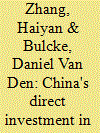

|
|
|
|
|
| Publication |
2014.
|
| Summary/Abstract |
While China is fast becoming an important outward direct investor, its companies are showing an increasing interest to locate in Europe and the European Union (EU). It has been suggested that this can partly be explained by the more lenient attitude of the European countries compared to the US, where some acquisitions were abandoned when they ran into political opposition based on security concerns. Yet, also in Europe, the media follow rather closely each new Chinese entry, and certain politicians have started to criticise the take-over of technology-oriented companies, especially by Chinese state-owned firms. Against the background of a very open foreign direct investment (FDI) policy as measured by OECD FDI Restrictiveness Index for the EU and the individual countries, an overview is given of the pre- and post-establishment obstacles to direct foreign investment. Also, the EU policy measures that directly or indirectly deal with incoming direct investment are discussed. Within the context of the EU competition policy and the merger regulation, the EU Commission has cleared five cases of take-over by Chinese state-owned enterprises. Although the Lisbon Treaty authorises the EU Commission to take charge of investment policy as part of the EU commercial policy, it will take time to realise this. If the announced negotiations about an investment treaty between China and the EU could work out the necessary balance, it would be an important step in achieving more reciprocity between their respective investment regimes.
|
|
|
|
|
|
|
|
|
|
|
|
|
|
|
|
| 2 |
ID:
129642
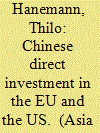

|
|
|
|
|
| Publication |
2014.
|
| Summary/Abstract |
Chinese outward foreign direct investment (OFDI) in developed economies has increased substantially in recent years, driven by policy liberalization and structural adjustments in China's economy. Efforts to accurately describe the dimensions of this increase are complicated by problems with official statistics and the complexity of deal structures. This article introduces the major problems of capturing data on global cross-border investment flows and elaborates on the particular difficulties of measuring Chinese outward FDI. It identifies alternative datasets that can help to better capture the scope and patterns of the Chinese overseas investment and uses one of them to describe the growth of Chinese investment in the EU and the US since 2000, highlighting similarities and differences in investment patterns in the world's two biggest economies.
|
|
|
|
|
|
|
|
|
|
|
|
|
|
|
|
| 3 |
ID:
129646
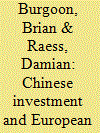

|
|
|
|
|
| Publication |
2014.
|
| Summary/Abstract |
The rapid increase in Chinese foreign direct investment (FDI) into Europe raises important questions about the implications of such for workers and organized labor in Europe: (1) does Chinese FDI flow more or less to regulated labor markets than do other investment sources?; (2) what are the strategies of works councilors and union representatives in dealing with real or expected investment from China?; and (3) how do individual workers view the propriety of Chinese FDI given China's low-wage, labor-unfriendly profile in the global economy? Quantitative and qualitative data on Chinese FDI, individual opinions about China and globalization, and on strategies of labor representatives provide some leverage to preliminarily answer these questions. First, Chinese FDI does not seem to be more (or less) focused on investing in the least regulated labor markets than other sources of FDI. Second, interviews with works councilors and union representatives in Germany, France and the Netherlands affirm a cautiously optimistic view of Chinese investors as no more or less threatening to organized labor than other investors. Third, analysis of attitudes about Chinese and European interests in managing globalization suggest that less-skilled, more vulnerable, pro-labor-union workers in Europe tend to be more rather than less enthusiastic about Chinese management than their fellow citizens. These patterns suggest a surprising, if tentative, embrace by workers and their representatives in Europe of that investment.
|
|
|
|
|
|
|
|
|
|
|
|
|
|
|
|
| 4 |
ID:
133810
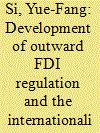

|
|
|
|
|
| Publication |
2014.
|
| Summary/Abstract |
The Investment Development Path (IDP) model has been widely accepted for illustrating the relationship between the inward and outward foreign direct investment (FDI) positions of a country and its economic status based on the data from developed economies. In recent years, however, outward FDI from developing economies has increased dramatically and it has been argued that institutions are 'forefront' factors in addition to the economic index. In this article, we use statistical data from China, which has gone through dramatic regulation reform and FDI development, to test the validity of the IDP model. We also trace the history of Chinese FDI regulation development to answer the following question: in what way are regulations important for FDI in different periods? We use Lenovo as a case study to show how a Chinese firm 'avoids' and 'adapts to' regulation changes. We find that the FDI development of China still follows the IDP model; however, the Chinese government has accelerated the whole process through active regulation reform. In a transition economy such as China, FDI co-evolves with the regulation, and the firms which can influence or foresee the policy changes can prosper considerably.
|
|
|
|
|
|
|
|
|
|
|
|
|
|
|
|
| 5 |
ID:
129647
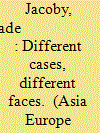

|
|
|
|
|
| Publication |
2014.
|
| Summary/Abstract |
Chinese investment in Central and Eastern Europe (CEE) is booming. As China's investment pattern has emerged so far, it appears to have little to do with Chinese firms' preferences for liberal policy regimes, tolerance for corruption, or reliance on communist-era networks. This article documents the current size and shape of Chinese firms' efforts to internationalize in this economic space, demonstrating an important difference between Chinese investment behavior in CEE and in the EU-15, namely the region's much more active use of greenfield activity (and lighter use of M&A and strategic alliances). Case studies of each mode (greenfield, M&A, and strategic alliances) reveal little evidence of a "China, Inc." approach and much evidence that Chinese firms are more motivated by market access than by technology or management assistance.
|
|
|
|
|
|
|
|
|
|
|
|
|
|
|
|
| 6 |
ID:
129644
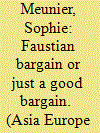

|
|
|
|
|
| Publication |
2014.
|
| Summary/Abstract |
This article explores the political challenges posed by the recent influx of Chinese outward foreign direct investment (OFDI) into the European Union (EU), which has become in 2011 the top destination for Chinese investment in the world. The central political question facing European states welcoming the influx of Chinese capital is whether this is a good bargain-a positive-sum game where both investor and investee benefit-or instead a Faustian bargain-a zero-sum game in the long term where capital is accompanied by implicit conditionality affecting European norms and policies, from human rights to labor laws. The novelty of Chinese FDI has the potential to affect politics in Europe in three different venues: inside European countries, between European countries, and between Europe and third countries. This article, whose main goal is to launch a research agenda on the political implications of Chinese FDI, explores in turn its potential impact on foreign and domestic policy, institutional process within the EU, and transatlantic relations
|
|
|
|
|
|
|
|
|
|
|
|
|
|
|
|
| 7 |
ID:
130584
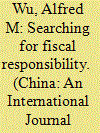

|
|
|
|
|
| Publication |
2014.
|
| Summary/Abstract |
The 2008-2009 global financial crisis has made budget management and fiscal responsibility more imperative in many developed economies. A budget crisis has not occurred in emerging economies such as China. However, in China, the demands of fiscal responsibility have increased against the backdrop of bulging government revenues in recent years. Over the past decade, the Chinese government has started to promote self-constrained bureaucracy and strengthen its fiscal responsibility and accountability in budget formulation and implementation. The 1999 budget reform that aimed to improve fiscal responsibility was hailed a success by previous literature. Drawing on field research in five counties in China between 2008 and 2010, it is argued that though some achievements have been made, the budget reform has not substantially improved both accountability and transparency within the bureaucracy. The implication of this study is that top-down, supply-side reforms led by the state may not be effective.
|
|
|
|
|
|
|
|
|
|
|
|
|
|
|
|
|
|
|
|
|